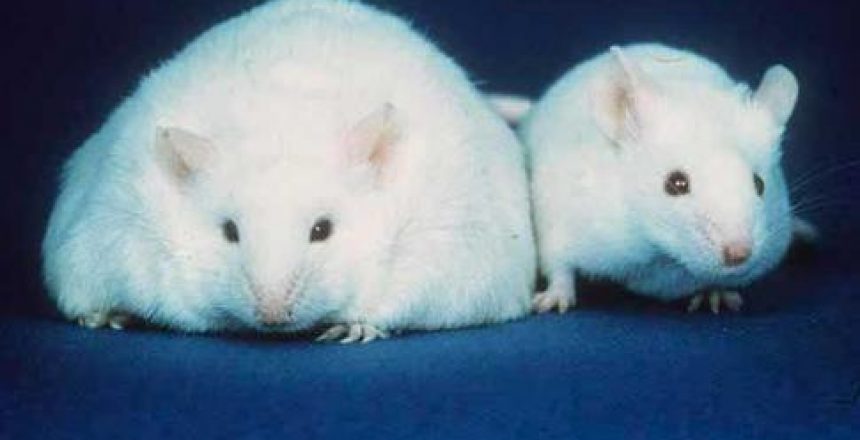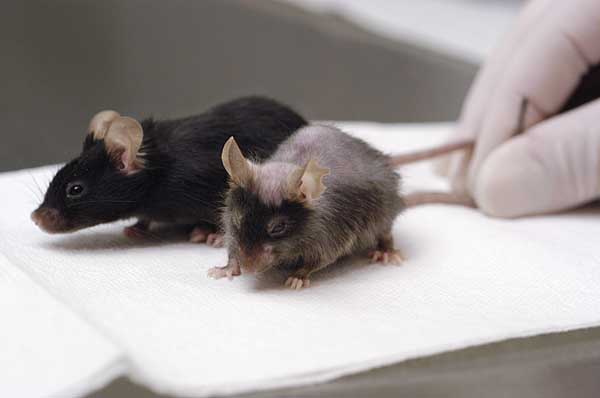Calorie restriction is the most robust life-extension intervention known. (Full text.) Animals that have their food severely restricted can live much longer — 50% or more longer — than fully fed animals. Yet calorie restriction and intermittent fasting may be nearly identical interventions.
Scientists have long researched and debated the mechanistic cause of the effects of calorie restriction (CR) on lifespan. The most common idea is that it reduces insulin and IGF-1 signaling, as well as mTOR activation, and that this sends the animal’s physiology into extended longevity mode. Insulin and the others are growth signals, so if this is true it agrees well with the idea that there’s a growth vs longevity trade-off.
One reason scientists have been keen to find answers is that CR has downsides. Immune function declines, and it can promote frailty. Body temperature decreases and people feel cold all the time; worst of all, sex drive declines.
In addition, humans have great difficulty practicing CR; it means strict discipline and often going hungry. After all, the only way they can get animals to do it is by locking them in a cage.
Hunger is required for CR benefits
Animals in a long-term CR regime are hungry all the time.
Measurements of animal responses when they cease restriction indicate that prolonged CR does not diminish hunger, even though the animals may have been in long-term energy balance. Neuroendocrine profiles support the idea that animals under CR are continuously hungry.
A key component of CR is the generation of hunger signals of the kind that fat tissue normally generates. This also suggests that hunger is important to the effects of CR.
Animals that are subject to every-other-day feeding, or alternate day fasting, appear to have a nearly identical lifespan extension to CR animals. And that’s not because they ultimately eat less: they gorge on food on feeding days and end up eating the same as ad lib fed animals.
So the effects of CR may not be due to fewer calories — or fewer protein, carbohydrates, or fat — but could be due to being hungry, which sends neuroendocrine signals that presumably play a role in life extension.
CR experiments are confounded by intermittent fasting
Further strengthening this line of thought, CR contains a significant component of intermittent fasting. Why is that?
For one, when fed, CR animals (mainly rodents) eat all their food at once, because they’re so hungry. If they’re fed once a day, then that means they fast nearly 24 hours every day.
Moreover — and you’ll love this one — because of the cost of staffing labs to feed animals, they’re at least sometimes not fed on weekends.
In some CR protocols there may be an inadvertent exposure to IF because the animals are fed a large ration on Fridays (3× the normal size) but not refed until Monday. Potentially then the animals may eat all the food on the first day and then be exposed to fasting until the next feed on Monday. The CR protocol would then be confounded by an IF exposure. Unfortunately the exact feeding procedures are not always detailed in papers that describe CR experiments. Moreover, these protocols are generally employed to reduce the staffing costs of feeding animals at the weekend.
A further piece of evidence that CR has been “contaminated” by fasting effects is that fat tissue seems to have a necessary, inverse connection to longer life.
Caloric restriction produces a variety of biological effects, including retardation of growth and development as well as a decrease in fertility. However, the primary factor in the life-extending effect of caloric restriction seems to be a reduction in adipose tissue.
Therefore it’s possible that the only “magical” thing CR is doing is stripping the fat off of CR animals and keeping them very lean.
Taking all in all, we have:
- hunger may be very important to CR’s beneficial effects
- intermittently fasted animals live longer but don’t eat less food overall
- CR experimental protocols may be seriously compromised by inadvertent intermittent fasting
- the primary factor in life extension by CR may be a reduction in fat tissue
Intermittent fasting may give lifespan extension of CR
Given all that I’ve listed, it appears that you can get all of the lifespan-extending benefits of calorie restriction just through intermittent fasting.
Fasting
- causes hunger, which may be the “secret” to CR
- doesn’t have the downsides of CR like frailty or loss of libido
- can reduce fat tissue
- and may be just CR in disguise
You read it here first: CR is just intermittent fasting in disguise, and you don’t need to reduce calories to get the benefits. Just periodic intermittent fasting.














21 Comments
I so hope that you are correct!
I’d be genuinely interested if you could get a scientist from the CR community to debate you on this.
Agree, Barron, that would be interesting.
Actually, this analysis kind of fits in with Taleb’s discussion of the value of hormesis. There may actually be more hormesis in IF than there is in CR, because in CR the body gets some food all the time. Very profound point….
Great website and P.D.’s understanding of health and wellness is extensive but this has been known for quite some time in the Paleo circles. IF is a basic tenet of Paleo protocol. It stands to reason that ancestrally, human kind evolved throughout periods of relative famine and thus, were well acclimated to fasting. It’d be a tough debate for whomever decided to take the opposing position. That whole “6 small meals a day” paradigm doesn’t seem to be the thing like it used to be….
Kinda think you missed the point.
P.S.: Let me rephrase that. Until now, the overlap between calorie restriction and fasting has been confined to obscure scientific journals. Virtually none of the explanations for the efficacy of calorie restriction, such as less fat tissue, less growth hormone and IGF-1, less oxidative damage, more hormesis, less iron accumulation (that one is all mine), better insulin sensitivity, and better leptin sensitivity, have included the fact that CR animals fast, a lot.
I have extended my IF time to 24h.
Before that I did two 18h fasts per week, which worked well, and I decided that additional 6h are no problem.
According to your diagram, I hope I profit even more from autophagy.
To manage tiredness and hunger I drink a lot of coffee and green tea with stevia sweetener, and to keep
up my metabolism I do 100 body-weight push-ups or squats every couple of hours.
I experience very satisfactory fat loss, and for some reason I got compliments that my skin looks clearer; good a thing, I guess.
I also can report success with low-carb-eating: I got rid of all added sugars and all foods with grain starches in it; zero-carb would be too much for me, I still want a few fruits, but that seems to be fine. A couple of weeks ago
I failed at my diet while attending a social event, and ate lots of cake, cookies and all the sugary stuff that I could find – that day, and the next, I experienced really difficult to control hunger pangs! That did not happen with a low-carb regime for weeks! I am therefore quite convinced that eating a lot of sugary and starchy food that increases blood sugar a lot in a short amount of time is kind of addictive and even stimulates appetite
even when one is full fed. Almost like eating a lot of sugar leading not to satiety, but to increased appetite, instead.
I am now extra cautious to avoid significant sugar loads – the short pleasure of indulging in that
feeling is not worth the troubles it causes later.
One problem with extrapolating rodent science to human metabolism is this: rodents live ten times faster than us. A phrase from a fasting study on mice is etched in my brain “on the third day 50 % of the fasted mice died from starvation” .
Imo Spindler is the best animal handler. His studies are very rigorous and can be read to see how true animal husbandry works. (Tl:dr no lights round the clock, no infectious disease spread inadverdently, compassionate staffers handle animals, no scary sounds, food not contaminated with sugar, iron, additives, not using rodents with broken genes etc etc)
Fontana, et al., Aging Cell, 2016, using CALERIE data, states that IGF-1 does not decrease in CR humans, unlike in rodents. This might be due to the feeding schedule of mice that you described.
However, Fontana et al also found that when people on CR lowered their protein consumption, IGF-1 promptly declined. https://pdmangan.com/the-sweet-spot-for-protein-intake/
Hi Dennis, very thought-provoking article. I have a couple of thoughts to add in to the mix – firstly is hunger REALLY important, and if so why do you think that is? I know that both yourself and others (eg Paul Jaminet) have written in the past that you should be able to get most of the benefits of IF if you are consuming a couple of teaspoons of coconut oil (to prevent the hunger). ie: as long as you avoid protein and carbs, a highly ketogenic fat such as coconut oil should be fine.. Have you changed your view on that?
Secondly, there is very interesting recent research which you may have seen from Dr Sachin Panda and also Dr Ruth Patterson from the Salk Institute (see links to video interviews on Rhonda Patrick’s site: https://www.youtube.com/watch?v=-R-eqJDQ2nU and https://www.youtube.com/watch?v=8qlrB84xp5g). Their studies have shown that you need to go 13 hours completely fasted OVERNIGHT (ie to link in with circadian rhythms) and that according to Dr Panda the only thing you should consume in those 13 hours is water, not even black coffee – since even that will signal to the body that it is now in consuming mode: ie anabolism. This is a new development for me, I hadn’t realized how important circadian rhythms were in fasting. I am trying to do the 13 hours water-only protocol starting at 6pm or 7pm, and then tack on an extra 3 to 5 hours the next morning where I am consuming only fibre (eg spinach & sauerkraut, tinned mushrooms) or coconut oil : ie no protein or carbs. The problem is it is just before my bed time here now, and I am starving hungry. If I just reach for a large teaspoon of coconut oil with some unsweetened almond milk (low carb/ low protein) then I will feel absolutely fine before I go to bed.. I’d be really interested to hear your view on whether you think it is a requirement to feel hungry (ie to only consume water, as per Drs Panda & Patterson) in order to get the benefits we want? All the best, Rob H.
Hi Rob. Hunger seems to be the result of certain neuroendocrine signals, so it’s not literally hunger – which after all is just a sensation in consciousness – but presumably these signals that have to do with life extension. All far from proven though. The aspect of hunger has even led some scientists to suggest that appetite suppressant drugs would not extend life even if they made you eat less. Again, speculative. I haven’t changed my mind on small amounts of cream or coconut oil with coffee, though now I’d place more emphasis on “small”. As for Drs Panda et al, I believe the 13 hour fast comes from the study (theirs?) which showed that breast cancer patients who fasted >13 hours overnight had far less recurrence of cancer. Correlational study. I don’t believe that’s a magical number of hours, and neither that coffee or tea (black or not) has anabolic effects. There are no calories, BCAAs, carbs, protein, or anything else in coffee or tea; furthermore, if anything, coffee and tea raise cortisol, a hormone associated with catabolism. (Calorie restriction also raises cortisol btw.)
Regarding the part about hunger and appetite suppressing drugs….I recall earlier you’ve mentioned hydroxycitrate and recommended it as it reduces hunger while fasting (and boosts autophagy). Has this information about the importance of hunger changed your views on that?
(I sure hope the appetite suppressing effects of coffee/green tea aren’t a negative….fasting without those beverages would be no fun at all!)
Good question. Short answer is my views haven’t changed. I think there may be a difference between short-term appetite and long-term leanness. I feel hunger when I fast, I just sort of override it; in any case, i believe I’m getting health benefits. Also, my view is that almost anything that boosts autophagy is healthy.
Nobody makes an automated mouse feeder?
Good question.
Perhaps someday Science can develop “electric brains”
to handle such mundane tasks.
Interesting as usual, thanks Dennis. If you don’t mind, I’d like to continue a bit of a conversation from a previous post on IF, specifically about alcohol. (I’ve looked back through a few months’ archives but can’t find the other post.)
My IF routine begins with not eating past 20:00. Supper’s usually over 30 minutes before that, and is on its way to my intestines by then. But I will normally have a beer or two til about 22:00, before bed. I then normally have breakfast at 15:30. So that’s nearly 20 hours without eating.
In the previous discussion, I’d asked about the caloric intake of the after-supper drinking. You were of the opinion that I shouldn’t count that time as fasting, as it’s time during which I’m consuming calories, so that my fast would begin at 22:00.
But now I wonder…the twelve hours it takes to enter the fasted state is due to food being digested and absorbed in the intestines. Food takes hours to digest, but not beer or wine, which enter the bloodstream and cause an insulin reaction very quickly, and would theoretically be over before the supper’s been digested and absorbed.
See where I’m going? The post-supper drinking doesn’t really delay the fast, I think, as long as it’s only a couple of hours long. If I drank til midnight or into the wee hours, that’d be a different thing. For the time being, I’m going to count my fasting routine as ~20 hours, even if I’ve drunk beer a couple of hours after fininshing eating. How convenient for me.
I now don’t really get hunger pangs til noon, and just ignore them, understanding it’s just a physical reaction to me being in fat-burning mode and appreciating the good it’s doing me. And gods, but does that breakfast feel and taste good! Normally eggs & cheese. So, so good.
I normally do it twice a week, on the days before a workout.
Is intermittent fasting a volume knob or an off switch? Eg will intake of forty or fifty calories after 16 hours of fasting completely halt autophagy?
Intermittent fasting has functions of both. You won’t get the benefits of fasting unless some minimum time has passed, I like to say 12 hours absolute minimum, and benefits increase with time, so 16 hours is better, 18 more so, etc. As for 40-50 calories, depends on what they are. Protein and carbs stimulate insulin and thus end autophagy, though that’s such a small amount of energy that one might quickly burn through it and return to a physiological fasting state. That’s guesswork though. Fat doesn’t stimulate insulin nearly as much; there seems to be debate as to how much, but small amounts appear OK.